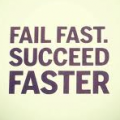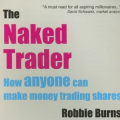As a Self-Development enthusiast, I’m also a great believer in research. One of the best ways to understand how you will achieve success is to draw inspiration from people who have already achieved. So in this post I have listed five of my favourite examples of creators, who came up with the idea for their creation, through a Eureka moment.
The only thing really, that these five amazing people have in common is the fact that their idea stemmed from a deep rooted desire or internal conflict. And that’s the reason I wanted to share them today, with you. Because I want you to know that anyone can think a great thought, but it takes a special person to take that great thought from the notebook and put it into the big wide world.
1) Nancy Yi Fan – The Sword-Bird Series
I mention Fan a lot in my posts because of the tender age she achieved her success with the Sword-Bird Series. Today I’m bringing her to your attention, for a different reason. And that reason is that the Sword-bird series that brought her this success came as a result of a dream she had about birds at war.
 You may argue that dreaming an idea, falls under the magic category. But not everything we can’t control is magic. All dreams come from some form of internal struggle or desire, and Nancy’s dream, it is believed, came from both of these things. Nancy had always had a passion for birds. And, pre-sword-bird, she was living her youth in New York City at a time when daily life was engulfed by the terrorism threats of 9/11.
You may argue that dreaming an idea, falls under the magic category. But not everything we can’t control is magic. All dreams come from some form of internal struggle or desire, and Nancy’s dream, it is believed, came from both of these things. Nancy had always had a passion for birds. And, pre-sword-bird, she was living her youth in New York City at a time when daily life was engulfed by the terrorism threats of 9/11.
In light of this, it’s hardly surprising that one day these themes built together and presented Nancy with an idea. If this is true, and great ideas are something built from our internal desires… then surely this means we can encourage great idea to happen, by having self-awareness.
It’s also worth noting that the endless hard working nights were far from fantasy or magic. What’s important to learn from Fan is that, even when the big idea is firm in your view, it’s your job to pull it out from the ground. She could have left it for a later date, but as her surroundings changed, so would her passions.
The New Year is a great time to evaluate your surroundings. What internal struggles are you facing? What do you feel most passionate about?
2) J.R.R Tolkien – The Lord of the Rings Trilogy
When marking papers at the University J.R.R Tolkien worked, the professor came across a blank exam paper.
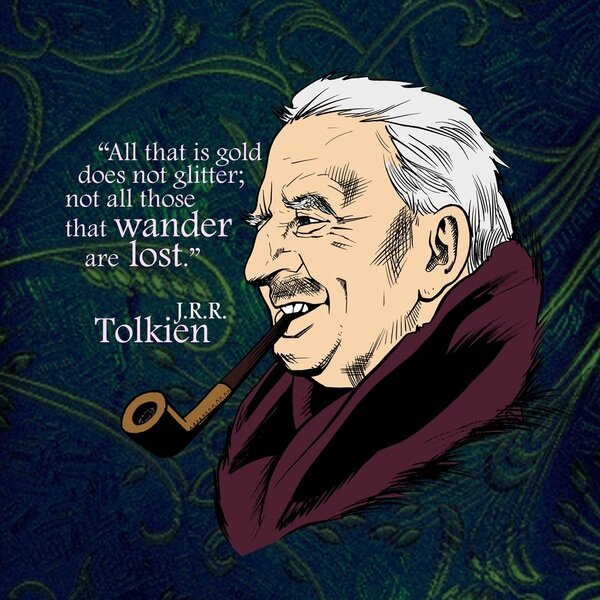 He wrote a single line, ‘In a hole, underground there lived a hobbit’ and EUREKA. Six years later the Hobbit was a fully completed novel and Tolkien had plans for a trilogy sequel to follow. A trilogy sequel, I might add, that became one of the most valued literary pieces in all of history.
He wrote a single line, ‘In a hole, underground there lived a hobbit’ and EUREKA. Six years later the Hobbit was a fully completed novel and Tolkien had plans for a trilogy sequel to follow. A trilogy sequel, I might add, that became one of the most valued literary pieces in all of history.
Was the hobbit an act of magic? Of coarse not. Tolkien spent ten years in total writing the Lord of the Rings and had always, for as long as he had been writing stories, felt a deepening desire within him to write fantasy for adults. Therefore, In fact, I’d go as far to say that it’s unfair to suggest that Tolkien’s success was a product of pure luck.
What we can learn from this is two things. Firstly, that the best ideas come from those that fulfil our deepest morals and secondly, any risk or idea, no matter how big or how small, is worth writing down. After all, these can often be the best clues to our bigger purpose.
Related Reading
J.R.R Tolkien: The Father of Fantasy… Life & Lessons
3) Percy Spencer – The Microwave
Percy Spencer had always been heavily interested in the field of Physics, so when the time came, he took the opportunity to work closely with magnetrons in his daily job.
One day Spencer began work as normal near a radar the day proceeded as normal, until he checked his pockets as he was leaving. The chocolate bar, which had been in his pocket at the time, had melted to nothing and being the clever engineer he was, Spencer began to think about the information he had discovered.

Eventually, after more and more and more though, Spencer came to the conclusion that if magnetrons can cook food from the inside out, he could create a device that cooked food faster for the world using the same scientific material. And thus the microwave was born.
Arguably, opportunities (like working with the magnetrons) and mistakes (having a chocolate bar in his pocket) cannot always be provoked. But because Spencer was already in an environment that fuelled his interests, it was more likely that such opportunity would arise. And it took someone special, with the right mindset, to see the mistake as a potential lemonade recipe.
To put it simply, even if he didn’t discover the microwave, being where he was with the mindset her had would have probably provided him with the tools need to dig up other great ideas anyway. Maybe not the microwave, but something equally as prestigious.
What we can learn from this is that it’s our job, as creators, to also be observers. And as observers it’s our job to ensure that we are always surrounded by the right kind of stimuli for our greater purpose.
4) Spencer Silver – Post-it Notes
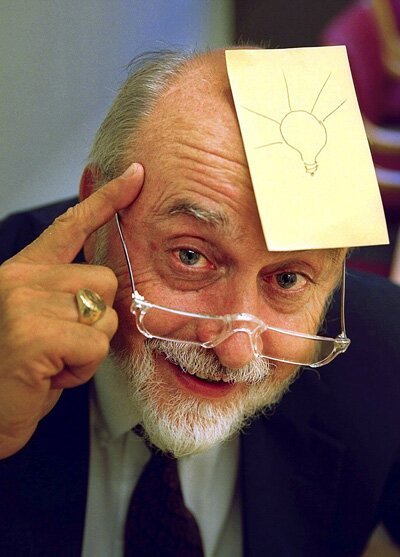 Low-tack, pressure-sensitive adhesive.
Low-tack, pressure-sensitive adhesive.
This invention that sounds as boring as it is. But something as trivial as ‘boredom’ didn’t stop Spencer Silver from pushing his idea forward and for years he continued to do just that, despite the reluctance of his company colleagues.
One day one such of these colleagues, Arthur Fry, was in church singing prayers. He became suddenly annoyed that the bookmarks in his hymn book wouldn’t stay put, and Dr Silver’s glue came to mind. He thought that adding Spencer’s adhesive glue to some paper would have fit the job perfectly.
What’s worth jotting down on a post-it note (sorry- I couldn’t resist) is the role of other creators, when creating ourselves. As stated in the introduction, one of the best ways to reach the top of your field is to understand your field well, know what it already provides and most importantly what it doesn’t. Sometimes it can take the perspective of someone else, to breathe an idea to life. Whether that’s your mind in their work, or their mind in yours. Always consider that you’re creating, for other people. It’s not good enough to create something clever, if it can’t be enjoyed or used.
5) Albert Einstein – Theory of Relativity
For years Einstein had been trying to prove two seemingly contradictory theories about time and space. One day, whilst riding a car home, he looked up and saw Bern’s famous clock tower.
Suddenly, all of his past research and theories came together in that moment to form the answer. That time can beat at different rates throughout the universe, depending on how fast you moved.
Now… being honest, that means nothing to me. Space and time, to me, are subjects that make great indie cult movies… and nothing more. But it meant something to him and, obviously, it meant something everyone else in the world of science.
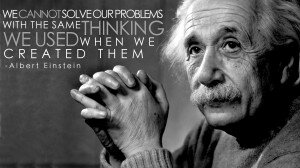
So what if, he hadn’t seen the Bern’s clock tower?
Some people will argue that, as creators, we could work forever and never get the Eureka moment we’re looking for; hence why so many of us don’t. Others will argue, however, that ‘great ideas’ are a product of ‘greatness’ entirely. That we control, the ideas that we get, through our environment and how hard we search within ourselves for Eureka.
I’d like to think that it’s a product of both. That you don’t have to be Einstein to be great, but you also need to allow life to happen spontaneously sometimes. And that’s what I’d like you to take away from this post if possible.
Because it’s true that nobody dropped from the sky and told Tolkien what a Hobbit was, where it lived, what it was like. But at the same time, the initial idea had to have been planted by something previously existing within the creator… So what I’m asking you to do this New Year is take a step back. Discover yourself. And don’t sit around waiting for the inspiration to come and find you.
Further Reading
What Makes A Great Leader? How You Can Master Leadership…
The Pros & Cons of Our Generation: How You Can Seize The Day…


